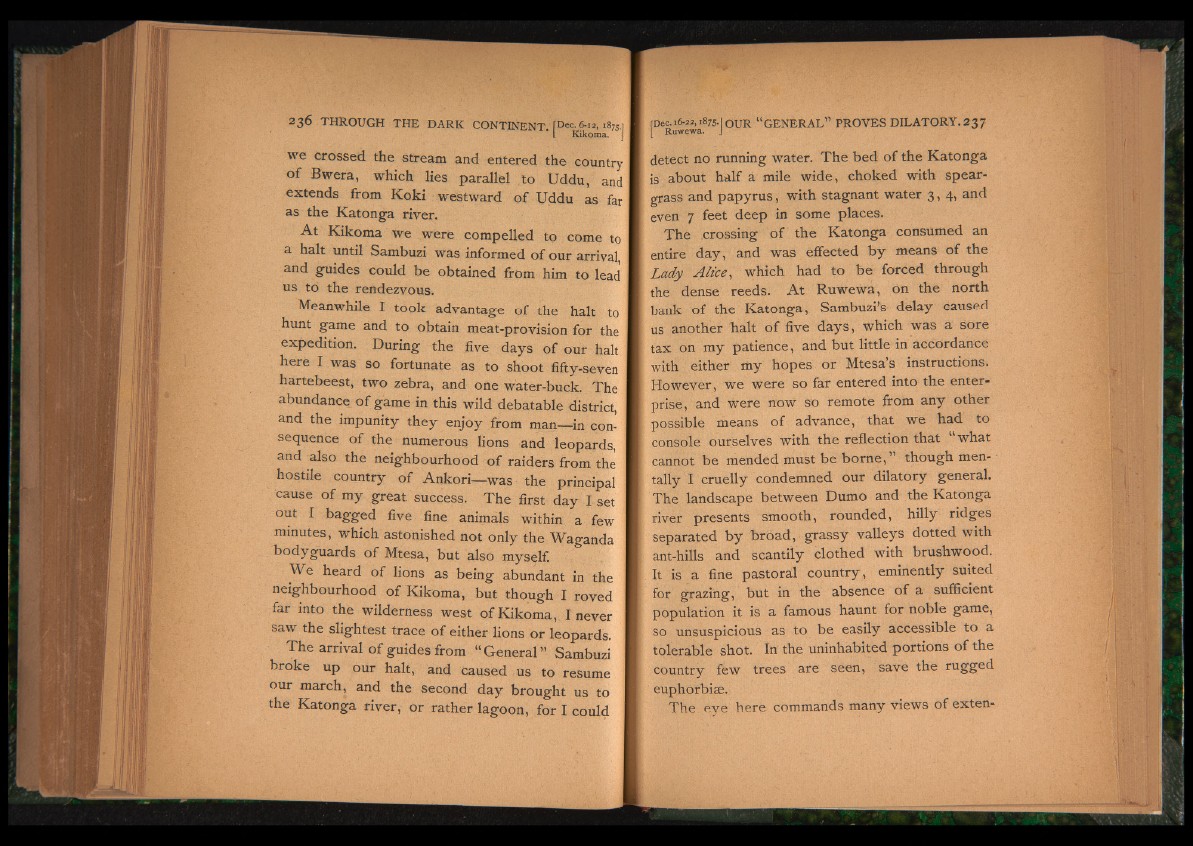
we crossed the stream and entered the country
o f Bwera, which lies parallel to Uddu, and
extends from K o k i westward o f Uddu as far
as the Katonga river.
A t Kikoma we were compelled to come to
a halt until Sambuzi was informed o f our arrival,
and guides could be obtained from him to lead
us to the rendezvous.
Meanwhile I to ok advantage of the halt to
hunt game and to obtain meat-provision for the
expedition. During the five days o f our halt
here I was so fortunate as to shoot fifty-seven
hartebeest, two zebra, and one water-buck. The
abundance o f game in this wild debatable district,
and the impunity they enjoy from man— in consequence
o f the numerous lions and leopards,
and ulso the neighbourhood o f raiders from the
hostile country o f Ankori— was the principal
cause o f my great success. The first day I set
out I bagged five fine animals within a few
minutes, which astonished not only the Waganda
bodyguards o f Mtesa, but also myself.
W e heard o f lions as being abundant in the
neighbourhood o f Kikoma, but though I roved
far into the wilderness west o f Kikoma, I never
saw the slightest trace o f either lions or leopards.
The arrival o f guides from “ General” Sambuzi
broke up our halt, and caused us to resume
our march, and the second d ay brought us to
the Katonga river, or rather lagoon, for I could
[Dec. 16-22,1875.] O U R “ g e n e r a l ” p r o v e s d i l a t o r y . 237
Ruwewa. J
detect no running water. The bed o f the Katonga
is about half a mile wide, choked with spear-
grass and p ap yru s, with stagnant water 3, 4, and
even 7 feet deep in some places.
The crossing o f the Katonga consumed an
entire day, and was effected b y means o f the
Lady A lic e , which had to be forced through
the dense reeds. A t Ruwewa, on the north
bank o f the Katonga, Sambuzi’s delay caused
us another halt o f five d a y s , which was a sore
tax on my patience, and but little in accordance
with either my hopes or Mtesa’s instructions.
However* we were so far entered into the enterprise,
and were now so remote from any other
possible means o f advance, that w e had to
console ourselves with the reflection that “ what
cannot be mended must be borne, ” though mentally
I cruelly condemned our dilatory general.
The landscape between Dumo and the Katonga
river presents smooth, rounded, hilly ridges
separated b y broad, grassy valleys dotted with
ant-hills and scantily clothed with brushwood.
It is a fine pastoral country, eminently suited
for grazing, but in the absence o f a sufficient
population it is a famous haunt for noble game,
so unsuspicious as to be easily accessible to a
tolerable shot. In the uninhabited portions o f the
country few trees are seen, save the rugged
euphorbiae.
The eye here commands many views o f exten